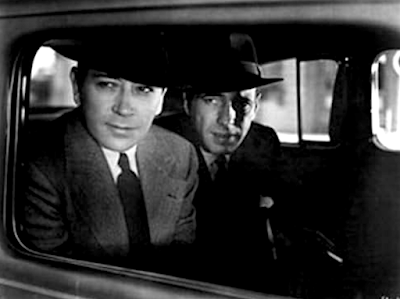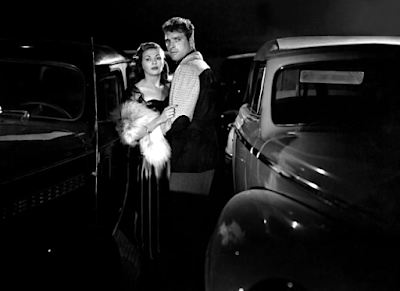 |
Burt Lancaster, Tom Pedi, “Criss Cross” (1949). |
Rolling bank vaultsa favored target of daring hijackers
By Paul Parcellin
If the movies are any indication, the 1940s and ’50s, especially the ’50s, must have been the golden age of armored car robberies — they were getting knocked over like clay pigeons in a shooting gallery.
A common armored car robbery movie plot: Ex-con, recently paroled, finds a crummy job. Meets a girl. Wants to impress the girl. Gets hungry for a big score. Joins a gang with a big scheme to tip over an armored vehicle. Risks life in prison or death (but what the hell). By showtime no one in the gang trusts anyone else in the gang. Ex-con doesn’t even trust the girl. The robbery goes down. Things go badly.
It’s fun just to see a complex heist plotted out in the low-tech middle of the last century. No closed circuit video, no satellite tracking devices, no cell phones — almost like robbing a stagecoach. Yet lawmen always seem to bust up those carefully laid plans.
With that in mind, here are 14 films from the days when we had a bumper crop of armored car robberies, at least in the movies:
 |
Paul Fix, David Oliver, Irving Pichel, Robert Wilcox, “Armored Car.” |
“Armored Car” (1937)
Police Detective Larry Wills (Robert Wilcox), eager to prove himself, takes an assignment to infiltrate a gang that specializes in violent armored car robberies. The gang appears to have inside information and it might be coming from someone working for the armored car company. Likewise, gangster Tony Ballard (Cesar Romero), who sets up the robberies, begins to suspect there’s a mole in his crew.
 |
| George Raft, Humphrey Bogart, “Invisible Stripes.” |
“Invisible Stripes” (1939)
Cliff Taylor (George Raft), gets out of prison and is determined to go straight, but finding work proves tough. His younger brother, Tim (William Holden), is in a dead-end job facing financial pressures. Cliff veers back into the dark side, reconnecting with his old associate Charles Martin (Humphrey Bogart), who is set to rob an armored car carrying payroll money. Cliff wants to give Tim enough cash to help keep him out of crime. But his good intentions end up backfiring.
 |
| Humphrey Bogart, Chick Chandler, “The Big Shot.” |
“The Big Shot” (1942)
Ex-con Duke Berne (Humphrey Bogart) wants to go straight, but then he reunites with old flame Lorna (Irene Manning) now married to shady attorney Martin Fleming (Stanley Ridges). She wants Duke to help her escape her loveless marriage. Martin uses his legal front to run a criminal enterprise and recruits Duke to take part in an armored car robbery. Duke resists, but caves in to protect Lorna.
 |
Yvonne De Carlo, Burt Lancaster, “Criss Cross.” |
“Criss Cross” (1949)
Steve Thompson (Burt Lancaster) rekindles his relationship with his ex- Anna (Yvonne De Carlo) but she’s married to gangster Slim Dundee (Dan Duryea). Slim finds Steve with Anna, and thinking fast, Steve tells Slim he came to propose a heist. The plan is to rob the armored car that Steve helps guard. Staging the robbery with Slim also allows him to stay close to Anna. But the holdup spins out of control and betrayal and double crosses doom Steve and Anna to a tragic end.
 |
Armored Car Robbery |
“Armored Car Robbery” (1950)
Criminal mastermind Dave Purvis (William Talman) organizes a gang to rip off an armored car outside a Los Angeles stadium. When the heist goes down a policeman is shot and killed. Det. Lt. Jim Cordell (Charles McGraw) vows to bring the killers to justice. Purvis tries to double cross his gang and escape alone with the cash, but Cordell’s dogged police work leads to a final showdown. The film’s semi-documentary style, it’s tight 67-minute runtime and its focus on police procedure and criminal psychology make it a standout among its peers.
 |
Wally Cassell, Steve Cochran, Richard Egan, Edward Norris, |
“Highway 301” (1950)
George Legenza (Steve Cochran) and his gang operate across Maryland, Virginia, and North Carolina, committing a series of robberies and murders. They’re cold-blooded and efficient, leaving a trail of bodies behind as they evade law enforcement. The film’s most intense action centers on the gang’s attempted armored car robbery. Legenza plans it carefully. He predicts that it will be their biggest score yet
 |
Richard Basehart, Marilyn Maxwell, “Outside the Wall.” |
“Outside the Wall” (1950)
Larry Nelson (Richard Basehart), paroled after serving time for manslaughter, is determined to go straight. He takes a job at a rural sanitarium and soon discovers that the facility is being used by a gang planning an armored car robbery. The criminal ring operates under the cover of legitimate medical care, and Larry slowly becomes entangled in their scheme, especially when he falls for a nurse (Marilyn Maxwell) who may not be as innocent as she seems.
 |
Lawrence Tierney, Marjorie Riordan, “The Hoodlum.” |
“The Hoodlum” (1951)
Hardened criminal Vincent Lubeck (Lawrence Tierney) is out on parole after serving a sentence. His straight-arrow brother gives him a job at his gas station, but Vincent, bored with the job, takes an interest in the armored car that makes regular stops at the bank across the street. He sets up a heist, and as the robbery unfolds things spiral out of control. Betrayal and needless bloodshed doom the caper.
 |
John Payne, Lee Van Cleef, “Kansas City Confidential.” |
“Kansas City Confidential” (1952)
Tim Foster (Preston Foster), a masked mastermind, plans a precise armored car robbery. To keep identities secret and prevent betrayal, he recruits three criminals — each masked during the planning and unaware of the others’ identities. The heist is executed with military precision, netting over a million dollars. Meanwhile, Joe Rolfe (John Payne), an ex-con working as a florist delivery driver, is unwittingly caught in the aftermath.
 |
Noble 'Kid' Chissell, Jack Daly, Douglas Kennedy, “The Big Chase.” |
“The Big Chase” (1954)
Det. Sgt. Dave Welton (Jim Davis) has to put his wedding plans on ice when a tip-off warns that an armored car robbery is in the works. Two-bit hood Benny McBride (Lon Chaney Jr.) is knee-deep in the planned heist that is being set up by gang leader Gus Henshaw (Anthony Caruso). Benny, desperate for money to support his pregnant wife, gets in over his head with the hardened criminals.
 |
Tony Curtis, George Nader, “Six Bridges to Cross.” |
“Six Bridges to Cross” (1955)
Jerry Florea (Tony Curtis), unable to resist the lure of fast money, falls in with a Boston gang planning a massive armored car robbery. The scheme includes using the city’s bridges and escape routes to their advantage. A big cash payout is at stake in this tension-filled operation, and it comes off without a hitch. But as the police close in, loyalties are tested.
 |
Max Showalter, “Indestructible Man.” |
“Indestructible Man” (1956)
Ruthless gangster Charles “Butcher” Benton (Lon Chaney Jr.) is a sentenced to “the big sleep” for an armored car robbery in which he killed several guards. After the execution, a mad scientist uses electrical treatments to bring him back from the dead. But the reanimated gangster has become an indestructible killing machine. That’s bad news for the mugs who double-crossed him.
“The Rebel Set” (1959)
Struggling writer John Mapes (Don Sullivan), angry rebel Ray Miller (Richard Bakalyan) and poor little rich kid George Leland (Jerome Cowan) hang out at a beatnik coffeehouse run by Mr. Tucker (Edward Platt). Mr. Tucker ropes the beatnik trio into a scheme to rob an armored car aboard a passenger train. The gang manages to steal the money, but paranoia, betrayal and guilt rattle the operation.
 |
Herman Boden, Jack Dodds, Mamie Van Doren, Marc Wilder, |
“Guns Girls and Gangsters” (1959)
Recently released con Chuck Wheeler (Gerald Mohr) hatches a bold plan to knock over an armored car loaded with casino cash during the New Year’s Day money run. Chuck reconnects with his old flame, Vi Victor (Mamie Van Doren), who’s now involved with gangster Joe Darren (Lee Van Cleef). The robbery goes down, but all three players have their own private schemes in mind.
 |
Cameron Prud'Homme, John McIntire, “Naked City, ” Episode, “Nickel Ride.” |
Bonus: vintage TV
“Naked City” Episode: “Nickel Ride” (1958)
Detectives visit the aging captain of the Staten Island Ferry at the same time that armed robbers are executing a daring heist of an armored car traveling on the ferry.



